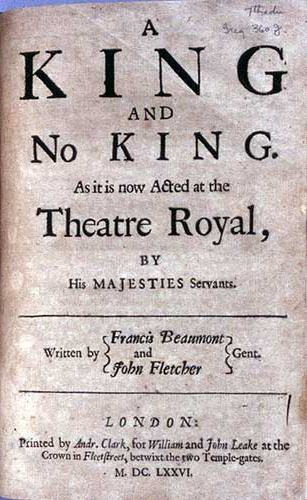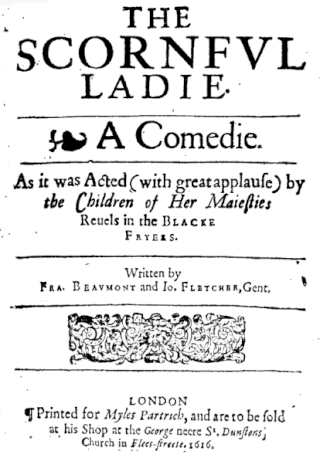Related Research Articles

Francis Beaumont was a dramatist in the English Renaissance theatre, most famous for his collaborations with John Fletcher.

Beaumont and Fletcher were the English dramatists Francis Beaumont and John Fletcher, who collaborated in their writing during the reign of James I (1603–25).

John Fletcher was an English playwright. Following William Shakespeare as house playwright for the King's Men, he was among the most prolific and influential dramatists of his day; during his lifetime and in the Stuart Restoration, his fame rivalled Shakespeare's. Fletcher collaborated in writing plays with Francis Beaumont and Shakespeare. Though his reputation has subsequently declined, he remains an important transitional figure between the Elizabethan popular tradition and the popular drama of the Restoration.
The Nice Valour, or The Passionate Madman is a Jacobean stage play of problematic date and authorship. Based on its inclusion in the two Beaumont and Fletcher folios of 1647 and 1679 and two citations in 17th-century sources, the play has long held a place in the canon of John Fletcher and his collaborators. Modern scholarship, however, has accumulated much internal evidence for the authorship of Thomas Middleton.
Cupid's Revenge is a Jacobean tragedy written by Francis Beaumont and John Fletcher. It was a popular success that influenced subsequent works by other authors.

Philaster, or Love Lies a-Bleeding is an early Jacobean era stage play, a tragicomedy written by Francis Beaumont and John Fletcher. One of the duo's earliest successes, the play helped to establish the trend for tragicomedy that was a powerful influence in early Stuart-era drama.
The Honest Man's Fortune is a Jacobean era stage play, a tragicomedy written by Nathan Field, John Fletcher, and Philip Massinger. It was apparently the earliest of the works produced by this trio of writers, the others being The Queen of Corinth and The Knight of Malta.
Four Plays, or Moral Representations, in One is a Jacobean era stage play, one of the dramatic works in the canon of John Fletcher and his collaborators. Initially published in the first Beaumont and Fletcher folio of 1647, the play is notable both for its unusual form and for the question of its authorship.
The Queen of Corinth is a Jacobean era stage play, a tragicomedy in the canon of John Fletcher and his collaborators. It was initially published in the first Beaumont and Fletcher folio of 1647.
The Little French Lawyer is a Jacobean era stage play, a comedy written by John Fletcher and Philip Massinger. It was initially published in the first Beaumont and Fletcher folio of 1647.

The False One is a late Jacobean stage play by John Fletcher and Philip Massinger, though formerly placed in the Beaumont and Fletcher canon. It was first published in the first Beaumont and Fletcher folio of 1647.
The Elder Brother is an early seventeenth-century English stage play, a comedy written by John Fletcher and Philip Massinger. Apparently dating from 1625, it may have been the last play Fletcher worked on before his August 1625 death.
The Double Marriage is a Jacobean era stage play, a tragedy written by John Fletcher and Philip Massinger, and initially printed in the first Beaumont and Fletcher folio of 1647.
Beggars' Bush is a Jacobean era stage play, a comedy in the canon of John Fletcher and his collaborators that is a focus of dispute among scholars and critics.
Love's Pilgrimage is a Jacobean era stage play, a tragicomedy by Francis Beaumont and John Fletcher. The play is unusual in their canon, in that its opening scene contains material from Ben Jonson's 1629 comedy The New Inn.
The Coxcomb is an early Jacobean era stage play, a comedy written by Francis Beaumont and John Fletcher. It was initially published in the first Beaumont and Fletcher folio of 1647.
Love's Cure, or The Martial Maid is an early seventeenth-century stage play, a comedy in the canon of John Fletcher and his collaborators. First published in the Beaumont and Fletcher folio of 1647, it is the subject of broad dispute and uncertainty among scholars. In the words of Gerald Eades Bentley, "nearly everything about the play is in a state of confusion...."

A King and No King is a Jacobean era stage play, a tragicomedy written by Francis Beaumont and John Fletcher and first published in 1619. It has traditionally been among the most highly praised and popular works in the canon of Fletcher and his collaborators.
The Captain is the title of a Jacobean era stage play, a comedy written by Francis Beaumont and John Fletcher. It was originally published in the first Beaumont and Fletcher folio of 1647.

The Scornful Lady is a Jacobean era stage play, a comedy written by Francis Beaumont and John Fletcher, and first published in 1616, the year of Beaumont's death. It was one of the pair's most popular, often revived, and frequently reprinted works.
References
- ↑ Robert F. Wilson Jr., "Francis Beaumont and The Noble Gentleman," English Studies 49 (1968), pp. 523–9.
- ↑ Terence P. Logan and Denzell S. Smith, eds., The Later Jacobean and Caroline Dramatists: A Survey and Bibliography of Recent Studies in English Renaissance Drama, Lincoln, NE, University of Nebraska Press, 1978; pp. 78.
- ↑ E. H. C. Oliphant, The Plays of Beaumont and Fletcher: An Attempt to Determine Their Respective Shares and the Shares of Others, New Haven, Yale University Press, 1927; pp. 183–201.
- ↑ Logan and Smith, p. 79.
- ↑ Freebury-Jones, Darren (8 March 2021). "John Fletcher's Collaborator on The Noble Gentleman". Studia Metrica et Poetica. 7 (2): 43–60. doi: 10.12697/smp.2020.7.2.03 . S2CID 234415643 . Retrieved 8 March 2021.
- ↑ Baldwin Maxwell, Studies in Beaumont, Fletcher, and Massinger, Chapel Hill, NC, University of North Carolina Press, 1939; pp. 147–65, especially p. 148.
- ↑ Gordon McMullan, The Politics of Unease in the Plays of John Fletcher, Amherst, MA, University of Massachusetts Press, 1994; p. 135.
- ↑ Arthur Colby Sprague, Beaumont and Fletcher on the Restoration Stage, Cambridge, MA, Harvard University Press, 1926; pp. 67–8, 238-44.